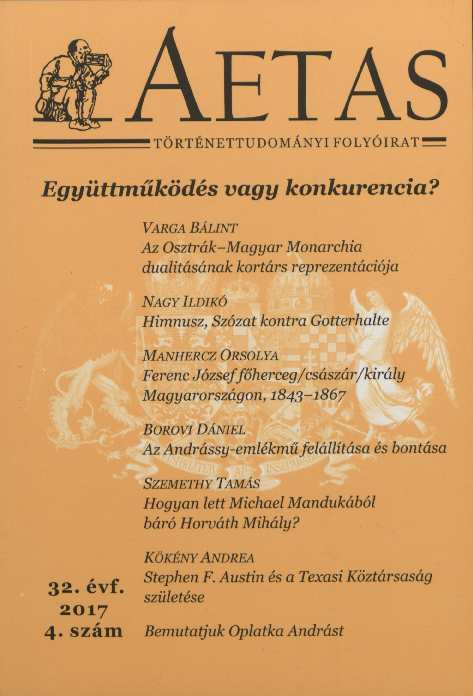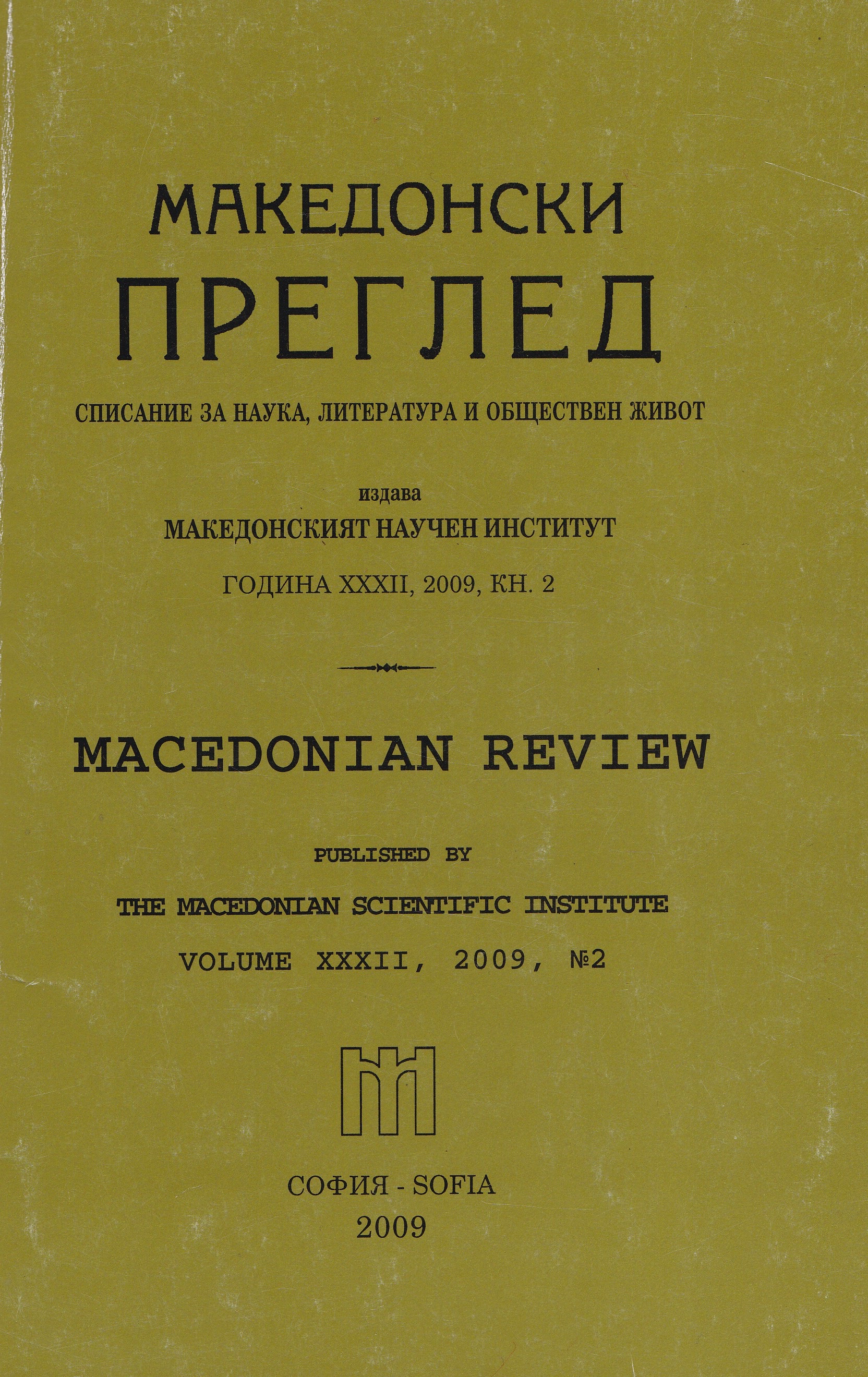
We kindly inform you that, as long as the subject affiliation of our 300.000+ articles is in progress, you might get unsufficient or no results on your third level or second level search. In this case, please broaden your search criteria.



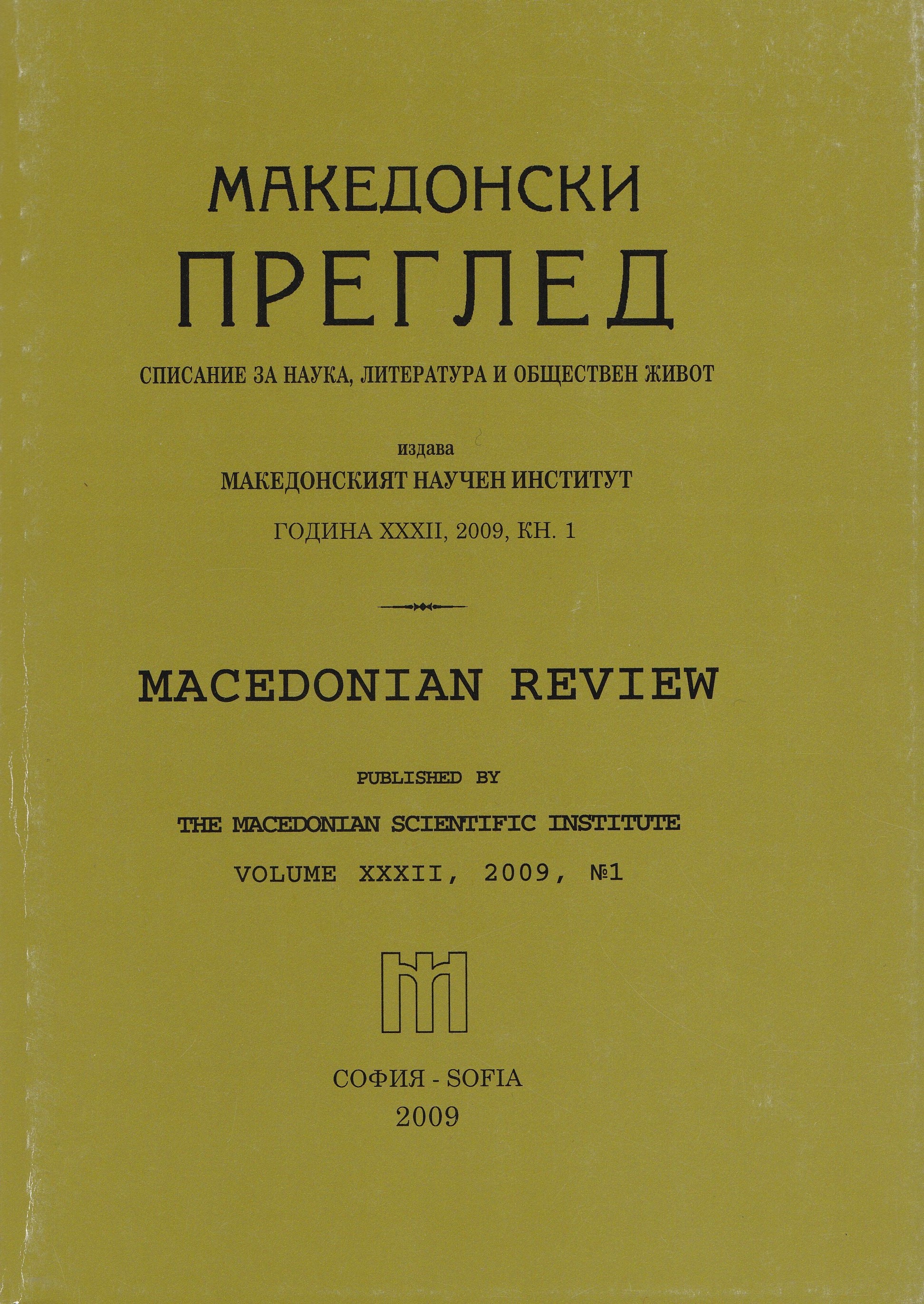
As a result of the global changes on the Balkans and in the world in the last decade of the XX c, the Macedonian question reached a new stage of its development.
More...
The article reveals the outrage of the Turkish authorities in the monastery of Gjurishte.On January 11,1912 the Turkish band attacked the monastery, killed nine people there, every one of them having his hands tied. Not only did the Turks kill the people but they also looted valuable objects from the monastery.
More...
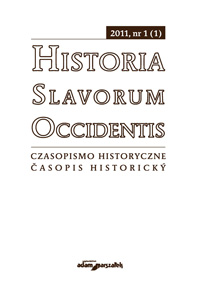
It was fifteen years ago, when a thirty-year retrospective of Polish and Czech historical and philological research was published. Unfortunately until now we do not have any similar resume for the last decade.The author does not summarize the research works conducted over past ten years, although he focuses on new publications. He rather pays his attention on shared research topics referring to Polish-Czech relations in medieval times. He also defines new research proposals and platforms for scientific co-operation. It is also worth emphasizing that in Poland there is undiminished interest in early medieval Czech history and Polish-Czech relations in that period. Thus we may observe various aspects and forms of cooperation. E.g. there are publishing projects like „Regesty dokumentów przechowywanych na Górnym Śląsku” or „Śląsk perła w Czeskiej Koronie” (Silesia – A Pearl in the Bohemian Crown). Polish and Czech historians meet each other during conferences organized by Komisja Dziejów Czech i Stosunków Polsko-Czeskich PAN (Commision of Czech History and Polish-Czech Relations/ Polish Academy of Sciences). They also attend conferences in Gnesno (every two years it takes form of Polish-Czech Young Medievists Forum) and Zabrze (conference cycle: „Central European Culture”). An interesting plat- form for cooperation might be recently founded Polish-Czech Scientific Society. Czech history and history of Polish-Czech relations gradually becomes a part of university teaching programmes and is represented in research programmes of scientific institutions. It all resulted in growing number of scientific publications.
More...
Both Habsburg rule over the Czech lands (1526) and – after the Battle of the White Mountain – the loss of Czech state sovereignty, were reflected in Pol- ish studies on Czech history. In principle the Czech lands were perceived as a part of Habsburg Monarchy. Thus previous Polish interest in Czech history and Polish-Czech relations in the 16th-18th centuries was limited and frag- mentary. In consequence, it still lacks multilevel synthesis of Czech history and Polish-Czech relations in early modern times. As far as political histo- ry is concerned scholars usually focus on three groups of research problems: 1) the role and place of Czechs during the period of three free elections, 2) Czech uprising of 1618 and its Polish context, and 3) the Siege of Vienna. Better represented are Polish-Czech cultural relations, e.g. bilateral linguis- tic and literary influences, school and education contacts (Komenski), print book circulation, merging of Polish and Czech artistic currents and trends, religious impact of reformation and counter-reformation. Yet, there are still unacknowledged research problems that are worthy of interest.
More...
This study offers a brief review of the main research directions and issues in the archaeology of identity. Discussed here are the components of identity – meaning the statuses and roles that determine the individual’s relation to, and membership in, a community as well as to other individuals, which are essentially the elements of social cohesion and social organisation – and its formation as well as the various options for categorisation and the modes of display through cultural memory and material culture
More...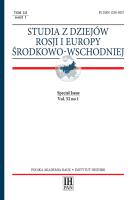
The period of five-century “Turkish yoke” of the Bulgarian lands brought up many deep and multifaceted changes in almost all areas of social life. The Bulgarian population, pushed aside on the margin of social life and deprived of almost all public rights, were unable to reconstruct their elites, destroyed physically and ideologically during the Turkish invasion of the Balkans. And it was for this reason that on the threshold of independence the Bulgarians had only a handful of people prepared to lead the nation and to perform a public service both on a local and national scale. The issue became especially important after Bulgaria regained its statehood in 1878, and social and economic problems of the young state were aggravated by the rivalry of the great powers fighting for influence in this part of Europe, which effectively attracted the attention of developing political milieux. This caused never-ending disputes within the Bulgarian political circles between supporters of a rapprochement with the West and advocates of closer relations with Russia, which, in turn, led not only to numerous political crises, but also implied changes in the highest levels of the government. Only the utmost determination did make it possible for the Bulgarians to overcome internal political problems and to make Bulgaria the leader of other Balkan countries already in the early 19th century. Those complex processes were observed, described and commented upon by Jan Grzegorzewski, and his texts are a perfect source of knowledge both for historians, and other scholars.
More...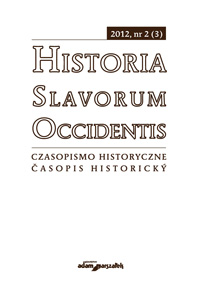

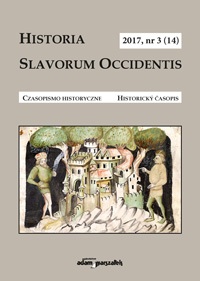
This paper analyses the difference in the perception, definition and usage of the concept of royal ideology in the tenth-eleventh-century Poland and Bohemia (or among Western Slavs in general) versus Scandinavia. It demonstrates that while Polish (and Czech) rulers agreed to follow Carolingian (‘Frankish’) model of royal power, the old pagan model of rulership preserved in Scandinavia seemed to secure more power for the king, including the truly royal title. The paper proposes that the West Slavic elites decide to enter the imperial system of Western Europe in an attempt to act as external members of the Christian and Imperial world, but instead they had to accept a new religion, rules, hierarchy and their own subordinate position. Hence, contrary to the general understanding, the coronations of the first three Polish kings were not symbols of sovereignty, but rather of dependence on the Holy Roman Empire.
More...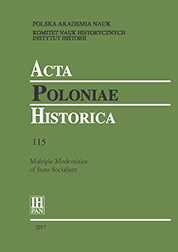
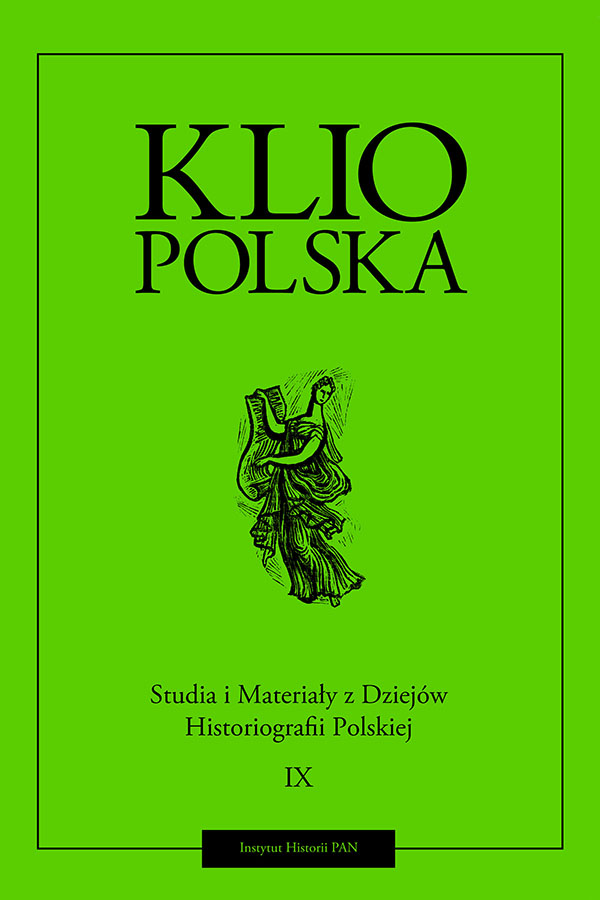
This article discusses the key elements of Vasily Klyuchevsky’s interpretation of Polish history as well as the reception of it in Polish historiography, mainly in works by Marian Henryk Serejski and Katarzyna Błachowska. Vasily Klyuchevsky was one of the leading representatives of the Russian liberal historiography at the turn of the nineteenth and twentieth centuries
More...
This article deals with Stefan Kieniewicz’s theoretical reflection on history in the years 1946–1948. A distinguished student of the history of the lands of partitioned Poland, Kieniewicz played his part in the elaboration of the Marxist interpretation of this period of Polish history. In the period under consideration, scholars still enjoyed a significant amount of freedom in the pursuit of their studies, including in terms of the search for methodological inspirations. The author’s attention is specifically drawn to Kieniewicz’s discussions of the strengths and weaknesses of the traditional model of historical research (the one based on the doctrine of individualistic historicism) on one hand and what was then regarded as new approaches to historical studies, inspired by Marxism and sociology, on the other. The author also attempts to show the extent to which these new inspirations informed Kieniewicz’s concept of ‘integral history’ and his program of the social history of partitioned Poland.
More...
In the years 1960–1966, communist Poland witnessed celebrations held to mark the thousandth anniversary of the rise of the Polish state. In organizing these events, the communist authorities hoped to neutralize the celebrations of the thousandth anniversary of the baptism of Poland, to be held in 1966, as announced by Cardinal Stefan Wyszyński in 1957. For obvious reasons, the question of the role of Christianity and the church organization in the formation of the Polish state was fundamental to the ideological struggle which the communist state waged against the Church. The traditional and well-established interpretation of the creation of the Polish state was based on the opposition between the idea of the state’s ‘self-generated’ and gradual birth on one hand and that of its violent emergence as a result of a foreign invasion and conquest on the other.In approaching the issue from the perspective of the latter variant, the author characterizes the key elements of the millennial interpretation of the creation of the Polish state. Although his focus is essentially on the historiography of the Polish People’s Republic, some attention is also devoted to the Polish historiography in exile.
More...
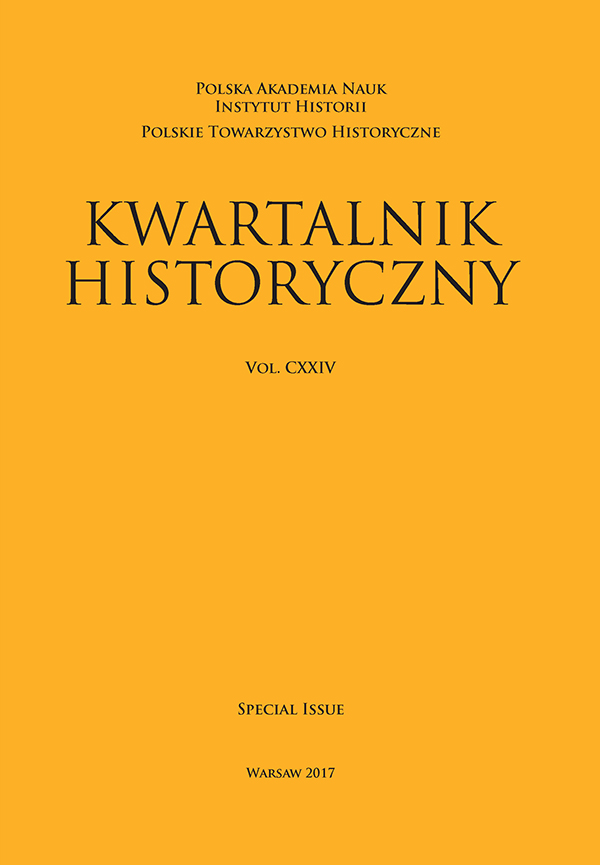
The paper is a critical review of Przemysław Urbańczyk’s monograph on Mieszko I, but rather than being a systematic discussion of the whole work, it focuses on those issues discussed in the book, which concern the relations between archaeology and history. Fragments basing exclusively on archaeological research are considered the most valuable by the author, whereas he is more critical about those parts which are based on the on interpretation of written sources. He postulates that such works, relating to both archaeology and history, should be created in close cooperation between representatives of both disciplines.
More...